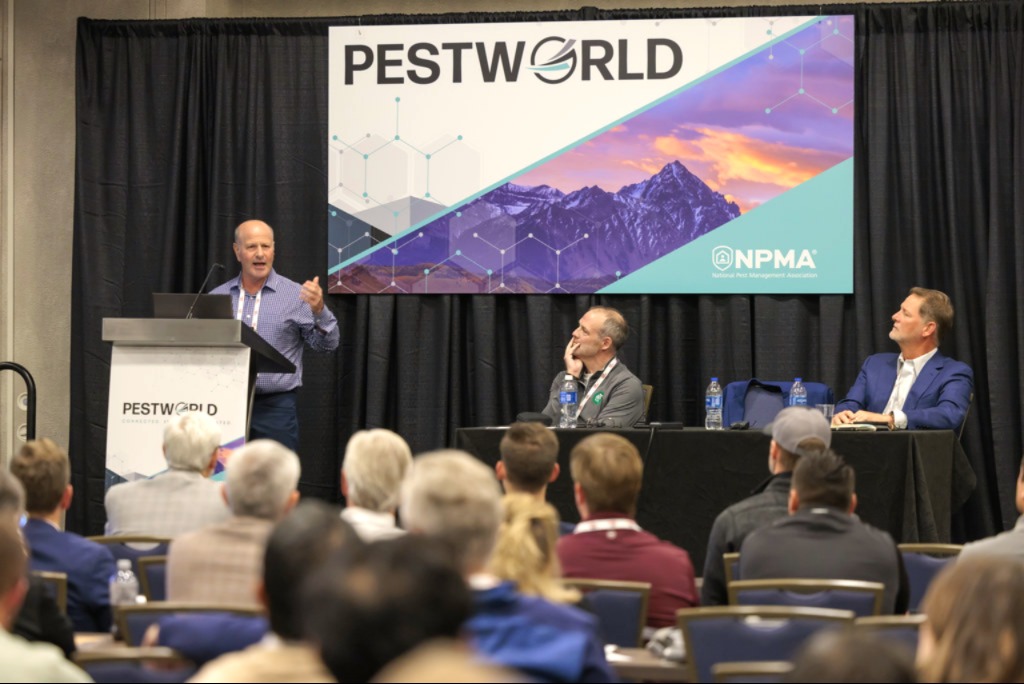6 Steps to Prepare to Sell Your Pest Control Company, Even If You’re Not Ready

Though you might not be thinking about an exit strategy, or considering selling your pest control business, experts at PestWorld in Denver say you should operate as if you expect to sell.
Here’s why.
No. 1, the number of buyers and investors in pest control companies is rising, a surge attributable to the industry’s strength and stability and to the spotlight in which professionals landed as essential critical workforce during the COVID-19 pandemic.
"I don't see any reason to believe it's going to let up," said Lance Tullius, a mergers and acquisitions specialist. "Personally, I think the runway ahead of us is pretty long."
But No. 2, preparing as if you are going to sell, even if it's not top of mind, means you're streamlining your business to operate as economically as possible and, in turn, driving up your earnings before interest, taxes, depreciation, and amortization, or EBITDA, and the company's value.
"The more technology you can put in your business, the more it's going to benefit you when you run efficiently, more profitably," consultant Kemp Anderson said. "You see things like auto pay, auto bill, notification to the customers: All those things really drive efficiency and profitability."
Tullius, owner of LR Tullius Inc., and Anderson, owner of Kemp Anderson Consulting, joined Dan Gordon, founder and managing member of PCO Bookkeepers/M&A Specialists, on a panel, "State of the M&A Market in the Pest Control Industry," at the National Pest Management Association's PestWorld in October. In addition, session host John Myers, CEO of U.S. Pest Control for Rentokil Terminix, also provided insight to a packed room of about 200 pest control company leaders. (Display photo: From left, Dan Gordon, Lance Tullius, and Kemp Anderson at PestWorld. | photo courtesy of Dan Chung, National Pest Management Association)
Here are six more things you need to know about the M&A and private equity market.
No. 1: Be intentional
Myers reminded leaders that they've made their own initial investments in creating their companies.
"The businesses you've built are your blood, sweat and tears, so be thoughtful about this step of selling your business," he said. "Don't be cavalier about this. Just start planning the sale before you want to sell."
Myers encouraged company leaders to take advice from the likes of Anderson, Tullius, and Gordon.
"Maybe you have a great accountant," Myers said. "Maybe you do have a great lawyer. But definitely don't be just rushing to, 'Hey, I want to sell tomorrow.' Be thoughtful, 'Hey, if I want to sell two years from now, start today and start planning accordingly.'"
No. 2: Find partners
Selling a company is not easy. That’s an understatement, but some companies do try to go their own way. The experienced panelists tout the benefits of the team approach.
"If you're thinking of selling, whether it is to a private equity firm or a strategic, it is a team sport," Anderson said. "You see people try to represent themselves. The cliché is 'they don't know what they don't know.' You don't want to do this alone. You just don't.
"The other part of the team would be good accountants or CPAs, good wealth managers so the money is managed properly on the back end."
Having a broker who understands the market and buyers is a start, Gordon said.
"Tax advisors are a really good thing, as well as a lawyer,” Gordon said. “And that lawyer should not be the lawyer who handles drunken driving and divorces and whatnot. That's got to be an M&A attorney, preferably one who has pest control experience."
No. 3: Know the buyers
In strategic acquisitions, Gordon said, analysts such as those on the PestWorld panel will know the companies interested in buying.
"Their money is good," Gordon said.
The same can be true of private equity companies that have found the pest industry appealing.
"There are some really good PE firms who are in the space," Gordon said. "And they're doing great things. They've hired pest people, and they're growing a good business."
But some firms are simply looking to buy and earn a return on investment.
"There are a lot of serious players, and there are a lot of tired players," Gordon said. "So just do your due diligence. Make sure you know where their money's coming from, make sure you know that they've done deals. Who have they done deals with? And maybe call some of the owners who sold and see what their experience was."
While some strategic buyers might just be looking for a deal, private equity sometimes can generate more uncertainty in the market.
"They don't know the industry like you do," Tullius said. "They're looking at a lot of different transactions in a lot of different industries. And to some degree, it is a numbers game for them.
"Ask a lot of questions," he added. "Do your own due diligence before engaging in an LOI (letter of intent) because they're not in the industry."
And if you've owned your own company, sometimes letting go to private equity investment can be difficult.
"They don't want to invest their money with someone else and be a minority owner and have no control after running their business their whole lives and being able to control all the decision-making," Tullius said of some pest control company leaders.
That said, Tullius still sees those as considerations, not as marks against private equity.
"All of what's gone on in the last few years is net positive," he said. "It's a tribute to this industry."
No. 4: When selling can be investing
A partnership with a private equity firm can turn out to be a strong investment for a pest control company owner.
"In most cases, one of the prerequisites is they want you, as the business owner and/or management, to invest some of your wealth, some of your value creation, alongside them," Tullius said. "Invest essentially in your business, rolling over equity in the pest control platform alongside the private equity group."
Those groups are able to build value and generate strong outcomes, Tullius said.
"Knock on wood, I've not seen anyone, whether it was my client or anyone else I know, lose," Tullius added.
No. 5: What a buyer will want to know
Getting your company prepared to be sold to another company or to private equity requires completion of a thorough punch list.
Strategic buyers will want to know about employee retention and culture, about residential and commercial sales, about pricing, about route density, Anderson said.
"They want to know a lot of the fundamentals," he said. "They want to know your culture. They want to know your HR policies right up front. Is this a marriage that can last?
"They will get to the P&L, I promise," Anderson said. "They will get to the balance sheet, guaranteed. They're going to want your tax returns every time. They're going to do their due diligence once they get the letter of intent."
Besides operational functions, Gordon also breaks down due diligence into financial and legal streams.
Financial: A buyer will seek a company's tax returns for sales, payroll, and local taxes and for financial statements. They'll also seek proof of cash.
"You said you were doing $5 million. Let's take a look at your bank statements. Do we see $5 million worth of deposits?" Gordon asked.
A buyer also will want to determine how much of the revenue is built on recurring business and the frequency of service, and they'll examine receivables, payables, margins, and average life of a customer.
Legal: A buyer's legal review of a pest control company will include corporate documents, state filings, the right to sell, whether lawsuits are pending, intellectual rights, trademarks, compliance, and human resources.
"Once it's all done, they'll share the findings," Gordon said. "And there's going to be a decision. There's three decisions that can be made based on the diligence. This company is not what you represented; deal off. This company is exactly what you represented: deal on. This company is kind of what you said; we want to negotiate the price."
No. 6: Now, about the price …
Among all of the insights the panelists shared, four points stand out among others regarding the price of a pest control company.
How it’s calculated: It’s complicated.
In the pest control industry, you'll hear a company's value stated as "3X on revenue," Gordon said.
"That's the way you talk about it in the bar and the restaurants and with all of your friends," he said.
In reality, valuation can be a multiple of free cash flow, a profitability indicator for a business after paying for operating expenses and capital expenditures.
"The question becomes, a 3X on revenue with a 20% free cash company would be a 15X on free cash or adjusted EBITDA," Gordon said. "How do I know what that multiple should be? It depends on the quality of revenue, the quality of the team, all the intangible factors.
"But we usually don't just say '2X' or '3X on revenue' or '4X.' It's usually a multiple of that adjusted EBITDA."
Anderson added that companies and private equity firms will employ complicated formulas to determine valuation.
"The PE firms may be running some sort of blended model, which would include this kind of cash flow and that present value on top of analysis of the business, certainly looking at EBITDA," Anderson said. "Every buyer does it a little differently because they value different things."
Why price might not be the key figure: And the price also will matter a bit less than tax impact.
"You should have a good CPA who can do the tax plan around this," Gordon said. "There's a lot of tax planning that can get done to help you. It's really not the price, but it's what you put in your pocket."
Whether values will continue rising: Back to Tullius and the “long runway,” he recalled a story of selling a business 10 years ago and becoming friends with its owner. Multiples, he said, were lower at the time.
"I told him, 'This is a great climate. I don't think the values are going to get any higher,'" Tullius said, drawing laughter during the PestWorld session. “He's still my friend, but he reminds me of that often.”
Though Tullius believes valuations might have reached a plateau, he doesn't rule out that they can continue to rise.
"I don't see anything that's going to, knock on wood, break the bottom anytime soon where we're going to see a big decline," he said.
Driving the best outcome: Gordon, Tullius, and Anderson, among other factors, are in agreement on how technology can help not only improve a company's current operations but its valuation.
Besides automation features that Anderson mentioned, Gordon also sees generating efficiency for technicians as a key.
"By increasing your route efficiency and increasing your prices, you're actually bringing your cost down such that your EBITDA goes up and therefore your valuation goes up," he said.
Tullius, in sizing up the industry's future, cited the capital interested in pest control, industry prospects, and room for growth, adding "and what technology can continue to do to this space."
Anderson said that more technology and efficiency in a business typically resulted in a higher company valuation.
"Businesses I suspect that all three of us see, that have more technology and more efficiency—I don't want to say always—but typically drive higher value," Anderson said. "I feel like we're on the front end of that. I still think there's a lot more technology to come."
And that's good news for leaders who are operating their business or might be considering a sale.
"The technology today certainly drives the bottom line," Anderson said, "and bottom line drives value."
What technology can do for your company
Your technology drives your bottom line, too. And you need a software partner that can help your business operate more efficiently, scale, and generate more revenue.
FieldRoutes software offers best-in-class tools in scheduling, routing, communications with customers, and more, driving value for your business. Here’s what FieldRoutes customers are experiencing:
21%: Average annual growth rate, within 18 months, for businesses that move to FieldRoutes*
23%: Average customer growth rate, within 18 months, for businesses that move to FieldRoutes*
30%: How much faster FieldRoutes customers in the PCT Top 100 grow revenue year-over-year compared to non-FieldRoutes customers (18.72% vs. 14.45%)
41%: Share of companies in the PCT Top 100 that are FieldRoutes customers
You're just one click away from a free demo to see how FieldRoutes can drive value for your pest control company.
* – Individual results may vary.






